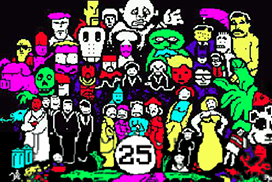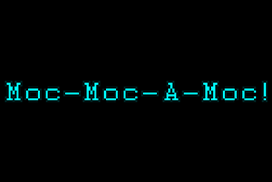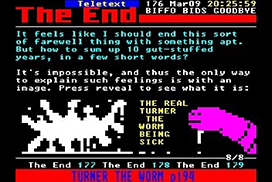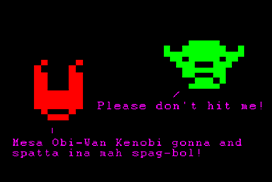
Grumble feature enabled

|
Refund, sir?
Edge #166, September 2006
As gamers, we may like different types of games, and own different systems, but we all share the experience of having to buy the games and hardware in the first place.
My earliest memory of a games shop (well, technically it was a shop that sold washing machines and fridges, with a little games section at the back) was this: my father took me to return a faulty Spectrum game, but when the man in the shop loaded up the tape - oh, wicked fortune! - it worked perfectly. My dad insisted that the game didn't work on the Spectrum at home (though, to be honest, he hadn't actually checked this, and was merely going on my word), and demanded a refund.
"We can't do that," said the man in the shop. "It's not our policy to offer refunds."
"Let me speak to your manager," demanded my father.
"I am the manager."
"Well then, can I have the number of your head office?"
"We don't have a head office."
The exchange continued for close to half an hour - with my dad insisting on speaking to ever higher authorities (the Prime Minister, Captain Kirk, God) - until he made a wholly unnecessary (not to mention out-of-context) racist remark, and dragged me out of the shop. With hindsight, it was more or less my fault; there was nothing at all wrong with the game, I simply hadn't liked it. My attempts at spoiling it with a magnet had failed, so I lied.
I also remember another early experience, going into a 'computer shop' - purely to browse, mind - and effectively being bullied into buying Populous by a suit-wearing shop assistant (this was in the days when the staff of 'computer shops' were still expected to dress smart). My resolve is stronger these days; when asked whether I want a reward card I usually kick the till off the counter and jab a pencil in the shop assistant's uvula.
Perhaps because of these formative encounters, I don't really like games shops.
Nowadays, it seems that there are two types of games shop. There is the high street chain, which tries to pretend to be a respectable establishment, but remains intimidating and confusing for the casual gamesplayer and/or present-buying relation. Maybe it's because the Chicken Little games get displayed alongside Hitman and Silent Hill. To whit: everything gets lumped together by format, rather than genre. That's semi-inevitable, of course, but it does sort of underline the relative immaturity of the industry. But that's by the by. The staff in these shops resemble proto-estate agents, and are typically managed by someone who is at least five years younger than you. Customers are called 'Sir' or 'Madam'.
Then there is the independent games shop, that looks like a cross between a corner shop from about 1973, a warehouse and a goth-rock club (oh, how I weep when I see bewildered mothers attempting to exchange a game above the din of industrial death metal). The staff dress in hilarious alternative clothing, and are pierced in that way people are when they want you to look at them, but don't actually have anything worthwhile or interesting to offer. The customers are called "What, yeah?"
I try to avoid games shops whenever possible. When I bought Me And My Katamari from my local HMV, I had a nice chat with a lovely young lady at the till. Then she started rambling on about wanting to marry the Prince, and shrieking about changing sex so she could become the King of All Cosmos, and I suddenly had to get to my appointment at the VD clinic.
It's fairly apparent that Sony, Microsoft and Nintendo (not to mention Valve) are hoping to bring an end to traditional methods of software distribution, and if they succeed - and sooner or later someone will - it'll signal the death of the high street games shop. Oh, we'll doubtless still have to buy hardware over a counter in the so-called 'real world', but I can't imagine there being much call for shops that only sell hardware, not games. The games industry will probably go full circle, and the PS4 and Xbox 490 will be sold alongside white goods.
I dare say it'll be some years before games shops die out completely, but - much as everyone is predicting the demise of record shops - it's bound to happen sooner or later, it's only a question bandwidth. If games shops do die the way many are expecting them to, then what happens to the bewildered mother trying to buy Dead Or Alive Big Tit Volleyball for her 14-year-old son? What happens to the second hand market (disgusting, amoral and illegal as it apparently, possibly, is... or something)? What happens to the disgusting and amoral import market?
Maybe I don't like going into games shops, but that doesn't mean they're not a necessary evil. I like the implied presence they give the games industry. Besides, I'm a terrible nostalgic - I've been known to weep when local petrol stations have closed - and the demise of the games shop will be a day for ghastly sobbing.
Mr Biffo co-founded Digitiser, Channel 4's Teletext-based videogames section, and now writes mainly for television
Do you know of any important moments from the annals of Digi history that have been omitted? If so, then mail me (superpage58@gmail.com) right now, man. Credit will be duly given for anything that gets put up.








